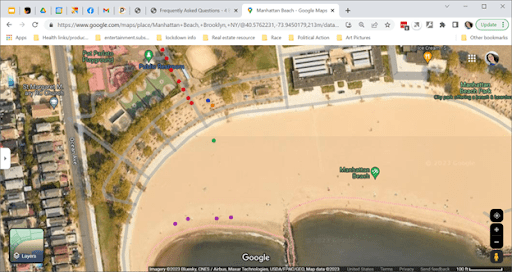Active Bystander: The Lost Toddler

What would you have done in this real-life situation?
My cousin, her almost-three year old, my spouse, and I were involved in a bit of drama in a public park in Brooklyn this month. This could have been a life-and-death situation, but no one intended any harm. Here’s what happened:
The location:
This is a public park with a children’s play area, tennis courts, then a section of picnic tables, then an expanse of ocean beach. The wind was blowing from the ocean, so sound traveled inland.
We entered along the path with the red dots. A toddler with two teenagers were where the blue dot is. The other adult active bystander was where the orange dot is. The adult man was where the green dot is. An adult woman and several other young children were where the purple dots are.
What we saw and heard:
As we came down the path towards the beach, we heard a very upset toddler screaming and crying. When we got to the table area, we saw he was under a picnic table and his body language was rigid. Two white female teenagers were standing by the table. As we approached, they asked if we knew this child. An adult white woman was on the phone, trying to help. She was talking to the police.
My cousin asked how long this child had been there. The teens said “about 20 minutes.”
What would you do?
I immediately headed for the beach to look for the parents. It took me a NY minute (!) to spot a man who was frantically running towards the picnic area. I asked him if he was looking for someone. He said, “My son.” I asked how old his son was. He said, “Two.” He was a large white man with a dark complexion and a Central Asian accent.
I pointed to the picnic table.
The adult woman on the phone with the police tried to keep the man from the child. She was scolding him for not watching his child. He ignored her.
The man went to the table, the child saw him and stopped screaming. The adult man took the child into his arms and ran back toward the beach.
This active bystander moment wasn’t over.
The women on the phone shouted at me, something about “How do I know the child is not being kidnapped?” She is still on the phone with the police, and she requested my help detaining the man.
I kept my head together. I quickly described how the child had been screaming — according to the teens — for 20 minutes. When the man arrived, he stopped. That’s a pretty good indication that the child recognized them man.
Very soon after, a woman with children — three or four others, under about ten years old — met the man on a bench near the picnic tables. There was lots of crying and hugging.
The other adult bystander saw that apparent family reunion and agreed that the child was not being kidnapped. She told the police that all was well. She left.
The teens were still in a bit of shock. I spoke to them briefly. They were still edgy about whether the child was with his real family. I told them to look at that group of people on the bench. The child clearly knows them all. Everyone there was loving the toddler, and they were relieved to find him safe.
I told the teens that they were the heroes of the day. They stayed with the toddler until he was safe. It is terribly hard to listen to an upset child! They should be pleased with themselves for doing this good deed.
It still wasn’t over.
My cousin – the mother of a six-year-old and an almost three-year-old – remained concerned that there were no consequences for the family who lost their toddler on the beach. That conversation continued over the family dinner table that night.
You have already read 600+ words, so I will recap that conversation next week.
Active bystander takeaways:
No one was trying to harm anyone else in this incident. However, the toddler was in danger. Everyone kept their focus on the safety of the child.
What do you think was the danger to the child? Adults and teens on the scene had differing opinions about what might harm this child and acted accordingly. The teens didn’t want to leave him alone; they were reacting to his fear and abandonment. The other adult bystander was concerned about neglect, and then kidnapping. The parents were concerned about drowning.
What was I concerned about? First, I was concerned with finding the parents. Then I was concerned about keeping the family together.
